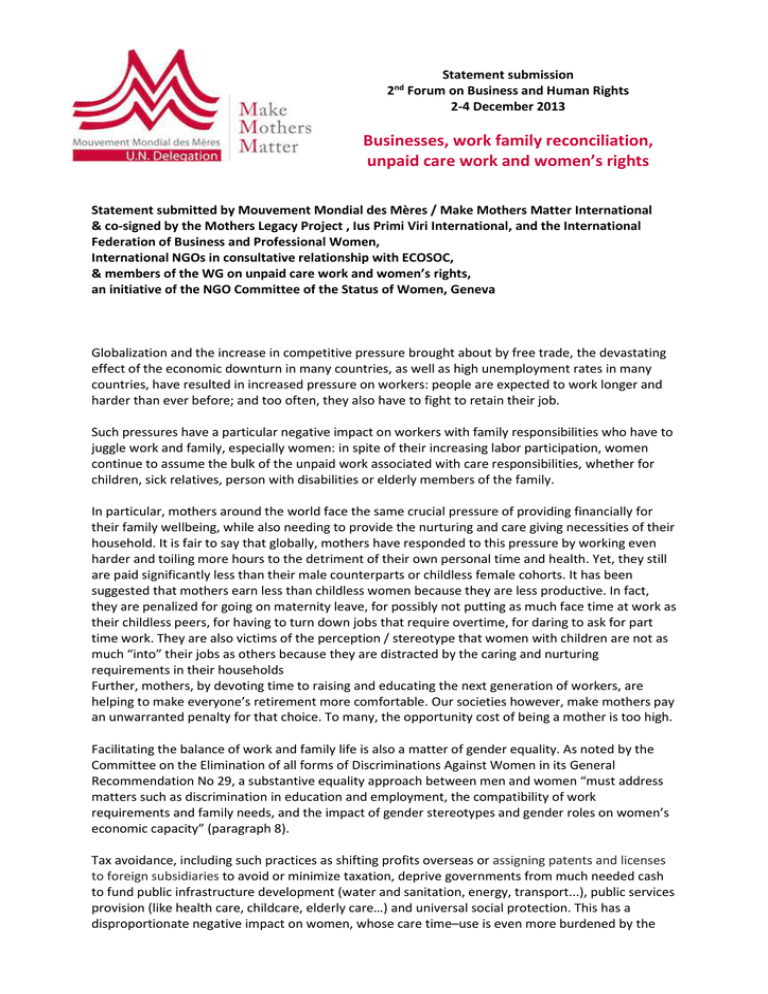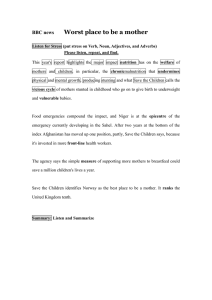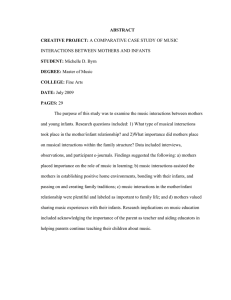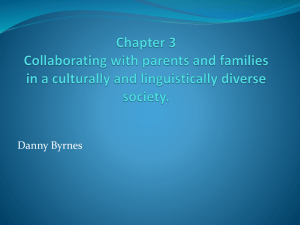Businesses, work family reconciliation, unpaid care work and women’s rights
advertisement

Statement submission 2 Forum on Business and Human Rights 2-4 December 2013 nd Businesses, work family reconciliation, unpaid care work and women’s rights Statement submitted by Mouvement Mondial des Mères / Make Mothers Matter International & co-signed by the Mothers Legacy Project , Ius Primi Viri International, and the International Federation of Business and Professional Women, International NGOs in consultative relationship with ECOSOC, & members of the WG on unpaid care work and women’s rights, an initiative of the NGO Committee of the Status of Women, Geneva Globalization and the increase in competitive pressure brought about by free trade, the devastating effect of the economic downturn in many countries, as well as high unemployment rates in many countries, have resulted in increased pressure on workers: people are expected to work longer and harder than ever before; and too often, they also have to fight to retain their job. Such pressures have a particular negative impact on workers with family responsibilities who have to juggle work and family, especially women: in spite of their increasing labor participation, women continue to assume the bulk of the unpaid work associated with care responsibilities, whether for children, sick relatives, person with disabilities or elderly members of the family. In particular, mothers around the world face the same crucial pressure of providing financially for their family wellbeing, while also needing to provide the nurturing and care giving necessities of their household. It is fair to say that globally, mothers have responded to this pressure by working even harder and toiling more hours to the detriment of their own personal time and health. Yet, they still are paid significantly less than their male counterparts or childless female cohorts. It has been suggested that mothers earn less than childless women because they are less productive. In fact, they are penalized for going on maternity leave, for possibly not putting as much face time at work as their childless peers, for having to turn down jobs that require overtime, for daring to ask for part time work. They are also victims of the perception / stereotype that women with children are not as much “into” their jobs as others because they are distracted by the caring and nurturing requirements in their households Further, mothers, by devoting time to raising and educating the next generation of workers, are helping to make everyone’s retirement more comfortable. Our societies however, make mothers pay an unwarranted penalty for that choice. To many, the opportunity cost of being a mother is too high. Facilitating the balance of work and family life is also a matter of gender equality. As noted by the Committee on the Elimination of all forms of Discriminations Against Women in its General Recommendation No 29, a substantive equality approach between men and women “must address matters such as discrimination in education and employment, the compatibility of work requirements and family needs, and the impact of gender stereotypes and gender roles on women’s economic capacity” (paragraph 8). Tax avoidance, including such practices as shifting profits overseas or assigning patents and licenses to foreign subsidiaries to avoid or minimize taxation, deprive governments from much needed cash to fund public infrastructure development (water and sanitation, energy, transport...), public services provision (like health care, childcare, elderly care…) and universal social protection. This has a disproportionate negative impact on women, whose care time–use is even more burdened by the lack of such public services and infrastructure, hampering their ability to participate in the formal economy, which in turn prevents them from receiving social protection benefits. Human Rights obligations are the responsibility of States under International Human Rights Law. But as set out in the UN Global Compact initiative, companies around the world are major actors in societies that can make significant contributions to the realization of all Human Rights, notably Women’s rights, including their right to work and economic empowerment Children’s rights and other care receivers’ rights (persons with disabilities, sick or elderly people) It is in particular essential that Businesses Respect international labor standard in each country of operation so that all employees can enjoy “decent work” that leaves enough time and energy for care obligations, while providing adequate living wages that can sustain families, as well as equal pay for equal job Respect international Human Rights standards, and notably ensure equal rights and non discrimination against workers with care responsibilities, by notably preventing discrimination against women on the grounds of pregnancy and maternity - Recognize that workers, notably mothers, can have seasons in their life, when their family concerns call for more presence and investment, whether for the education and nurturing of children or the care of an elderly member of the family, and seasons when they feel free to work longer hours outside the home Implement family friendly work environments by: - offering flexibility, notably through flex time, but also through part time work or job sharing - providing a healthy work environment - accommodating the special needs of pregnant women - allowing parental leave, that can be taken either fulltime or on a part time basis - facilitating mothers’ transition back to work and to remain in the work force - providing on-site childcare facilities Pay their fair share of taxes in each country where they operate, as a major contribution to the reduction of poverty and its gendered imbalance. In other words, the corporate sector must recognize that care work is essential for everyone’s wellbeing and the future of our societies, that unpaid care work subsidizes the whole economy, and that it needs to be supported. It is a matter of Corporate Social Responsibility. Corporations around the world have to seriously tackle their social responsibility: people’s wellbeing is not only a matter of legislation assigned to governments. The private sector has to actively contribute and innovate to make the workplace an effective, equal-opportunity and flexible environment so that workers, women and mothers in particular, can be productive participants without the added fear and stress that their participation in the workplace may diminish their ability to tend to the next generation of productive workers, or to care for the elders who grew the businesses and relayed them to the current management. It is also a win-win strategy: investments in a family friendly work environment will result in more committed and more effective employees, and together with a fair contribution to States resources it will contribute to a better image of the company. Last but not least, research consistently shows that family friendly policies and genuine efforts to close the gender gap, especially in leadership positions, has a significant impact on a company’s performance, competitiveness and integrity.



